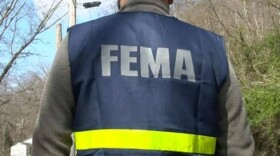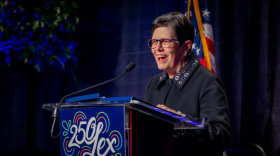The Detroit River is the mile-wide boundary that separates the United States and Canada. And the city park on the Windsor, Ontario, side of the river offers a better view of the Detroit skyline than anywhere else.
In a quirk of geography, Detroit actually sits north of its Canadian neighbor. Natives like Stephen Santarossa, who's from Windsor, love this bit of trivia and relish the puzzled look on visitors' faces as they try to draw that mental map.
"Do you realize that you are now looking north?" he says.
But these two cities share more than just a border. There are international love affairs and families that span both sides of the river. And you can venture across the border for a day trip that feels just a little exotic.
Victor Savic and Anne Marie Champagne sit on a park bench in Windsor, gazing at the Detroit skyline.
"We're two countries," Savic says, "but it's one community. It's the best view." Champagne adds, "And from here it doesn't look like they're having problems."
But Savic's been watching Detroit's financial catastrophe unfold, and he says it's painful — like seeing a family member fall on hard times. Savic, like some others in Windsor, is convinced Detroit will rebound from this crisis.
"It's sad they came to this state," he says. "There's so much potential there. It's too bad."
Eddie Francis has been the mayor of Windsor for the last 10 years, and it has not been an easy decade. Just like on the other side of the border, housing values here have plummeted. Windsor's unemployment rate has been among the highest in Canada.
"So financially, I'm certainly keenly aware of the challenges the City of Detroit faces," Francis says. "But I also know the bankruptcy is going to allow them to reset and come out stronger. And we've seen that with the automotive industry."
And it's through the auto industry that the economies of the two cities are most tightly intertwined.
On any given day, Francis says, thousands of semi-trucks cross the border carrying car parts five or seven times before making it to the final product.
"That's integration," he says.
The Ambassador Bridge links Detroit and Windsor, and it's the busiest international border crossing in North America in terms of trade volume. About 10,000 trucks cross this bridge every day.
And it's not just car parts that shuttle back and forth.
There are about 5,000 Windsorites who commute across the border to work in Detroit-area hospitals each day and more who work in other fields.
Gerry Oglen works for Wayne State University, the public university in Detroit. He grew up rooting for the Detroit Tigers, he says, and listening to the music of Motown. So it's been difficult to bear witness to Detroit's decline, Oglen says.
"Will it get better? I think so," he says. "And I think as Detroit begins to rebuild, Windsor begins to benefit."
And so Oglen and his Canadian neighbors will continue to watch Detroit from their front-row seat. They'll be rooting for the Motor City to put its financial house in order as if it were their own hometown.
Copyright 2013 Michigan Radio







